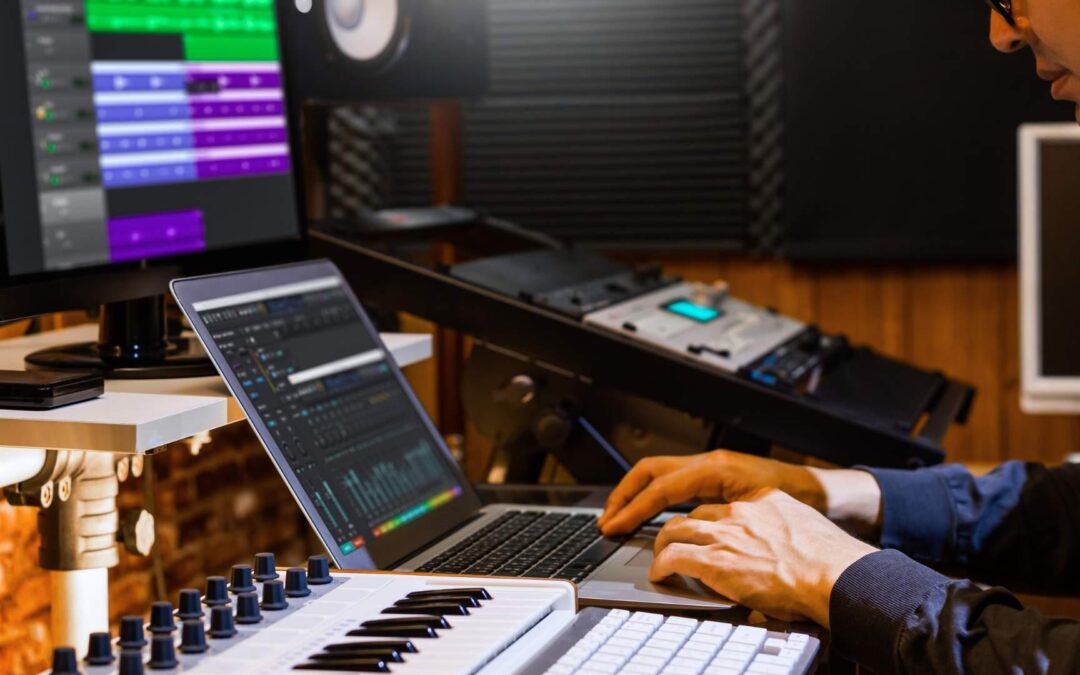Breaking into the music composition industry can be a daunting task, but with the right approach, passion, and perseverance, you can turn your dream into a reality. The journey involves honing your craft, building a network, and consistently showcasing your work. At Musicians Institute, we offer a specialized Music Composition for Visual Media program designed to equip you with the skills and knowledge necessary to succeed in this competitive field. In this blog post, we’ll explore key steps to help you break into the music composition industry.
1. Develop Your Skills and Knowledge
To stand out in the music composition industry, you need a strong foundation in music theory, orchestration, and various composition techniques. Here’s how you can develop your skills:
- Formal Education: Enroll in a reputable music composition program, such as the one offered by Musicians Institute. Our program covers essential topics like music theory, harmony, orchestration, and scoring for visual media, providing you with a comprehensive education.
- Online Courses and Tutorials: Supplement your formal education with online courses and tutorials. Websites like Coursera, Udemy, and YouTube offer valuable resources on different aspects of music composition.
- Practice Regularly: Consistently work on your compositions. The more you compose, the better you’ll become. Challenge yourself by experimenting with different genres and styles.
2. Build a Strong Portfolio
Your portfolio is your calling card in the music composition industry. It showcases your skills and versatility as a composer. Here’s how to build a compelling portfolio:
- Diverse Compositions: Include a variety of compositions in your portfolio. Show your ability to write for different genres, moods, and instruments. This diversity will demonstrate your versatility to potential employers and clients.
- High-Quality Recordings: Ensure that your recordings are of high quality. Invest in good recording equipment or collaborate with a professional studio to produce clean, polished tracks.
- Visual Media Scores: Since you’re aiming to break into the music composition industry for visual media, include scores for short films, commercials, or video games in your portfolio. This will show your ability to synchronize music with visual content.
3. Network and Collaborate
Networking is crucial in the music composition industry. Building relationships with other musicians, composers, and industry professionals can open doors to new opportunities. Here are some tips:

Blog Post
"*" indicates required fields
By submitting this form, I authorize Musicians Institute (MI) to make or allow the placement of calls, emails, and texts to me at the phone number that I have provided, including through the use of automated technology, or a prerecorded or artificial voice. I understand that I am not required to provide my phone number as a condition of purchasing any property, goods, or services. I agree to the terms of MI’s Privacy Policy. MI will not sell or rent your information to third parties, and you may unsubscribe at any time.
- Attend Industry Events: Participate in music festivals, film festivals, and industry conferences. These events are excellent opportunities to meet like-minded individuals and potential collaborators.
- Join Professional Organizations: Become a member of organizations like the American Society of Composers, Authors, and Publishers (ASCAP) or the Society of Composers and Lyricists (SCL). These organizations offer networking events, workshops, and resources for composers.
- Collaborate with Filmmakers and Game Developers: Reach out to independent filmmakers, game developers, and other content creators. Offer to score their projects to gain experience and build your portfolio.
4. Market Yourself
Marketing yourself effectively is essential to gaining visibility and attracting potential clients. Here’s how to do it:
- Create a Professional Website: A well-designed website serves as your online portfolio. Include your bio, contact information, samples of your work, and testimonials from previous clients.
- Leverage Social Media: Use social media platforms like LinkedIn, Twitter, and Instagram to showcase your work and connect with industry professionals. Share your compositions, behind-the-scenes content, and updates on your projects.
- Utilize Music Platforms: Upload your compositions to platforms like SoundCloud, YouTube, and Bandcamp. These platforms allow you to reach a broader audience and gain feedback on your work.
5. Keep Learning and Adapting
The music composition industry is constantly evolving, with new trends and technologies emerging regularly. To stay relevant, you need to keep learning and adapting:
- Stay Updated on Industry Trends: Follow industry news and trends through blogs, podcasts, and industry publications. Understanding current trends will help you tailor your compositions to meet market demands.
- Learn New Technologies: Familiarize yourself with the latest music production software and tools. Being proficient in industry-standard software like Logic Pro, Ableton Live, and Pro Tools will make you more competitive in the job market.
- Seek Feedback and Improve: Actively seek feedback on your work from peers, mentors, and industry professionals. Use this feedback to improve your skills and refine your compositions.
Conclusion
Breaking into the music composition industry requires dedication, continuous learning, and strategic networking. By developing your skills, building a strong portfolio, networking, marketing yourself, and staying adaptable, you can pave the way for a successful career in music composition.
At Musicians Institute, our Music Composition for Visual Media program is designed to help you achieve your career goals. Our comprehensive curriculum and experienced instructors provide the perfect environment for aspiring composers to thrive.
Ready to take the next step in your music composition career? Contact Musicians Institute today to learn more about our Music Composition for Visual Media program and how we can help you achieve your dreams.

